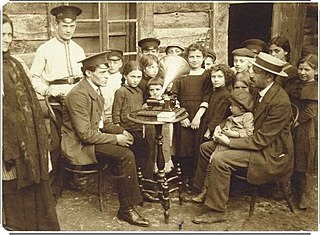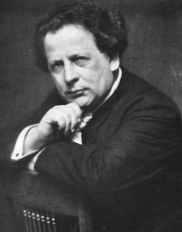
Klezmer is an instrumental musical tradition of the Ashkenazi Jews of Central and Eastern Europe. The essential elements of the tradition include dance tunes, ritual melodies, and virtuosic improvisations played for listening; these would have been played at weddings and other social functions. The musical genre incorporated elements of many other musical genres including Ottoman music, Baroque music, German and Slavic folk dances, and religious Jewish music. As the music arrived in the United States, it lost some of its traditional ritual elements and adopted elements of American big band and popular music. Among the European-born klezmers who popularized the genre in the United States in the 1910s and 1920s were Dave Tarras and Naftule Brandwein; they were followed by American-born musicians such as Max Epstein, Sid Beckerman and Ray Musiker.
Ukrainian music covers diverse and multiple component elements of the music that is found in the Western and Eastern musical civilization. It also has a very strong indigenous Slavic and Christian uniqueness whose elements were used among the areas that surround modern Ukraine.
John Wesley Work III was an American composer, educator, choral director, musicologist and scholar of African-American folklore and music.
Yiddish song is a general description of several genres of music sung in Yiddish which includes songs of Yiddish theatre, Klezmer songs, and "Yiddish art song" after the model of the German Lied and French mélodie.
Nikolay Alexandrovich Sokolov was a Russian composer of classical music and a member of the circle that grew around the publisher Mitrofan Belyayev.
Jewish music is the music and melodies of the Jewish people. There exist both traditions of religious music, as sung at the synagogue and in domestic prayers, and of secular music, such as klezmer. While some elements of Jewish music may originate in biblical times, differences of rhythm and sound can be found among later Jewish communities that have been musically influenced by location. In the nineteenth century, religious reform led to composition of ecclesiastic music in the styles of classical music. At the same period, academics began to treat the topic in the light of ethnomusicology. Edwin Seroussi has written, "What is known as 'Jewish music' today is thus the result of complex historical processes". A number of modern Jewish composers have been aware of and influenced by the different traditions of Jewish music.
Ofer Ben-Amots is an Israeli-American composer and teacher of music composition and theory at Colorado College. His music is inspired by Jewish folklore of Eastern-European Yiddish and Judeo-Spanish Ladino traditions. The interweaving of folk elements with contemporary textures creates the dynamic tension that permeates and defines Ben-Amots' musical language.
Louis Harry Danto was a lyric tenor and cantor. He was acclaimed for his cantorial music, concert appearances and recordings of Italian, Russian, and French opera repertoire. Danto performed throughout North America, Europe and Israel, and recorded 24 solo albums.

Joel Engel was a Russian music critic, composer and one of the leading figures in the Jewish art music movement. Born in the Russian Empire, and later moving to Berlin and then to Mandatory Palestine, Engel has been called "the true founding father of the modern renaissance of Jewish music."

Moisei Beregovsky was a Soviet Jewish folklorist, musicologist and ethnomusicologist from the Ukrainian SSR who was a key figure in the study of Jewish music. He collected, studied and published about klezmer music, Yiddish song, wordless nigun melodies, and the music of Purim plays. His published collections, mostly only released after his death, remain important sources of Jewish music from the late Russian Empire and early Soviet period. Most of his research was done during the period of 1927–1949, during the Stalin era, during which he was faced not only with ideological restrictions, but a period of imprisonment in a forced labour camp from 1950 to 1955. He was rehabilitated after 1955 and continued his work in his final years during the Khrushchev-era.

Mark Olf was a Jewish folksinger and recording artist. Accompanying himself on the guitar, Olf documented and preserved Yiddish and Hebrew folk songs, many of which he had heard as a child in Russia.

Susman Kiselgof was a Russian-Jewish folksong collector and pedagogue associated with the Society for Jewish Folk Music in St. Petersburg. Like his contemporary Joel Engel, he conducted fieldwork in the Russian Empire to collect Jewish religious and secular music. Materials he collected were used in the compositions of such figures as Joseph Achron, Lev Pulver, and Alexander Krein.
Lev Mordukhovich Tseitlin, known as Leo Zeitlin, was a Russian-Jewish composer. In 1923, he emigrated to the United States. His best-known work is Eli Zion, a paraphrase for piano and cello "on a folk theme and trope of 'Song of Songs'".

Hans Kronold was a Polish-born Jewish cellist, composer, educator, and a member of symphony orchestras of New York and Boston. He was the first cellist to have his work recorded on audio, which he did for recording pioneer Gianni Bettini phonograph cylinders in the 1890s.

Bracha Zefira was a pioneering Israeli folk singer, songwriter, musicologist, and actress of Yemenite Jewish origin. She is credited with bringing Yemenite and other Middle Eastern Jewish music into the mix of ethnic music in Palestine to create a new "Israeli style", and opening the way for other Yemenite singers to succeed on the Israeli music scene. Her repertoire, which she estimated at more than 400 songs, included Yemenite, Bukharan, Persian, Ladino, and North African Jewish folk songs, and Arabic and Bedouin folk songs and melodies.
Ruth Rubin was a Canadian-American folklorist, singer, poet, and scholar of Yiddish culture and music.
Sofia Magid was a Soviet Jewish ethnographer and folklorist whose career lasted from the 1920s to the 1950s. Among the materials she collected were folksongs of Volhynian and Belarusian Jews and among the only prewar field recordings of European klezmer string ensembles, as well as the music of Russians and other ethnic groups of the USSR. Although she was largely unknown abroad during her lifetime, in recent years she has been seen alongside Moshe Beregovski and other Soviet Jewish ethnographers as an important scholar and collector of Jewish music.

Mascha Benya, born Masha Benyakonsky, was a Russian-born soprano known especially for her promotion and performance of Yiddish and Hebrew folk and art music in the United States after World War II. After a short career as an opera singer in the Jüdischer Kulturbund in 1930s Berlin, she emigrated to New York after Kristallnacht and became an important figure in the teaching of Yiddish and Hebrew song through the Workman's Circle, Kaufman Music Center, and other organizations, as well as a touring singer, radio performer, and recording artist.
J. & J. Kammen Music Company, commonly known as the Kammen Brothers, was a sheet music publishing company operated in Brooklyn, New York by Jack and Joseph Kammen from the 1920s to the 1970s. The company published Jewish music as well as non-Jewish music. They owned the rights to some well-known songs such as Bei Mir Bistu Shein. Their Klezmer Fake books were by far the most popular of their time, offering arranged interpretations of Jewish wedding repertoire for non-specialist musicians.








